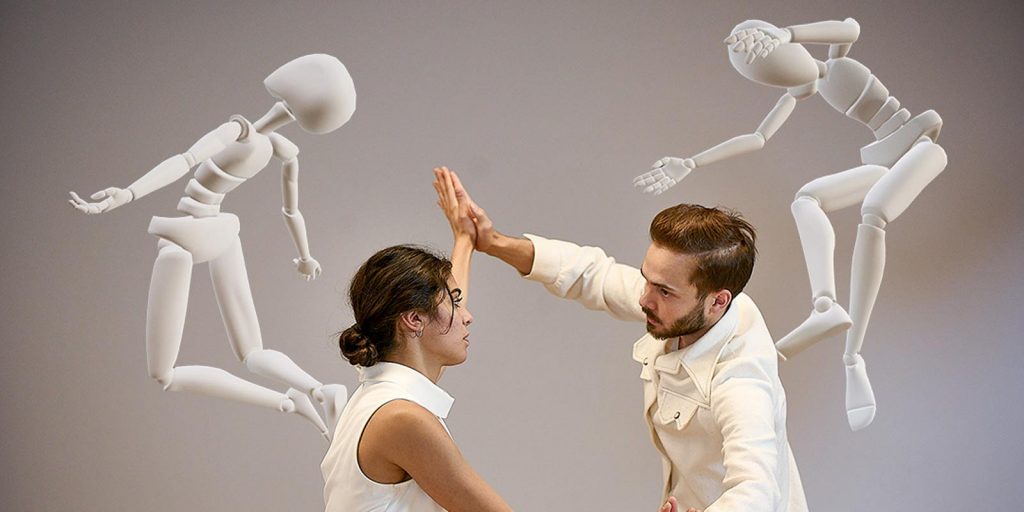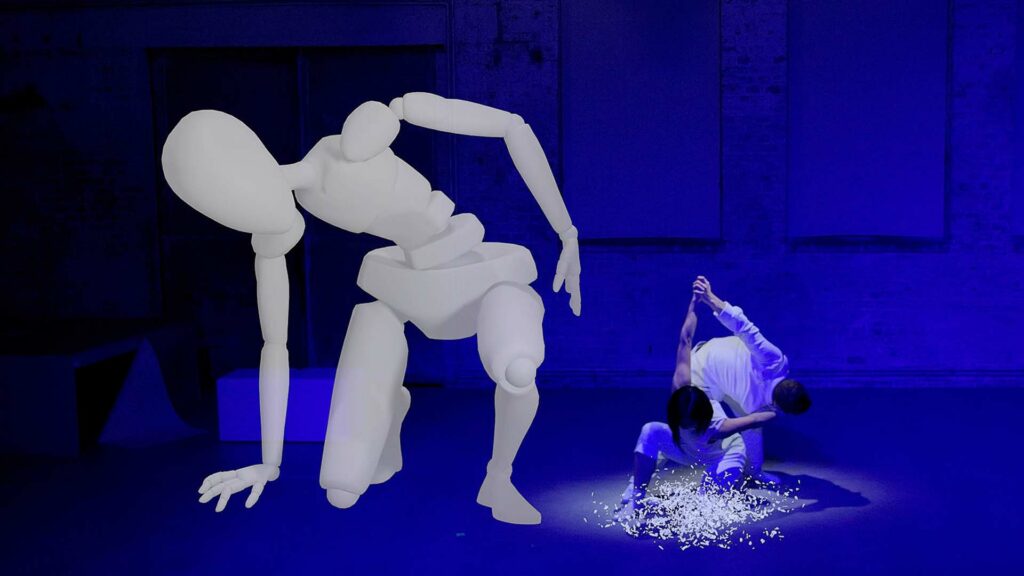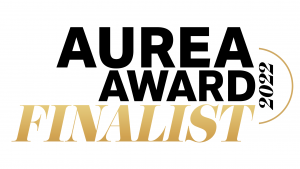
The performance is the development basis as well as the reference project for the novel AR_Loopmachine
After NICO AND THE NAVIGATORS were able to convince more than 3,000 audience members of the performative possibilities of augmented reality glasses with the production “Verrat der Bilder” (Betrayal of Images) in over 100 performances for the Bauhaus anniversary in 2019, the research will be consistently continued with the new project “Du musst Dein Leben rendern!” (You must render your life!) funded by the German Federal Cultural Foundation.
The DOCKdigital is the perfect partner for this, because for over a year now they have been experimenting with motion capture suits from Rokoko – in other words, data suits that digitally capture the movements of real bodies so that the data can be processed for further use. In order to bring these two technologies together in an uncomplicated and flexible way, a new type of AR loop machine is being developed, with the help of which dancers can, for example, develop a pas de deux with a 3D image previously generated from themselves. The spectators see the dancers in real space and, with the help of the AR glasses, their animation, which seems to unite with their original in the dance.
The AR Loopmachine will continue to be available and its content will be further developed within the framework of educational and mediation formats in digital laboratories.
The project “You must render your life!” choreographed by Yui Kawaguchi for two dancers, Florian Graul and Lujain Mustafa, and their virtual clones is the basis for development and the reference project for the AR-Loopmachine by Oliver Proske and Moritz Kiefer.
The movement sequences of the two dancers, recorded by means of motion capture suits, are transferred to AR glasses. Comparable to a loop station for live musicians, the AR-Loopmachine enables the performers to enter into a dialogue with their own moves and to dance a duet with themselves. This apparent interaction between real body and artificially created image is accompanied by the sound surfaces of trumpeter Paul Hübner. The relation between analogue reality and virtual extension shifts with the audience’s selectable point of view, which can move freely in the space: real and virtual bodies multiply, change their size – the game begins.
Yui Kawaguchi, who has been the protagonist of NICO AND THE NAVIGATORS for years, draws inspiration from the ancient Pygmalion myth, among others, which deals with the fateful relationship of a sculptor to his lifelike statue – in love with his own work of art, which he prefers to life or brings into life – a motif echoed in art to this day.
How strongly can an emotional bond with or even dependence on the virtual counterpart be developed? Can man encounter his perfect self in artificial spaces? Must you render your life?
This navigational project takes place at the interface of visual and performing arts.

At Dock 11, Nico and the Navigators and Chris Ziegler presented their performance “You have to render your life!” at the “Humandroid” festival, which consisted of two etudes for three dancers. They measured the field between virtual and analogue space, virtual and their own bodies – and opened up spaces for thought.
It banged and glittered: the Berlin season opener makes one euphoric - despite the gloomy forecasts that have been made for the theatre lately. Also, or precisely, because of heavy material in times of crisis: Reason for a song of praise.
The forecasts for the future of theatre have recently been rather moderate. But now, the start of the season in Berlin has been so glittering that I am optimistic, almost euphoric. All right, Berlin is not yet Germany or representative of (German-language) theatre. But when two season openings in quick succession transition seamlessly from the end of the play to standing ovations, I find that relieving in view of the many dirges of the past months - and worth a column.
Current theatrical momentum
For example, there was a standing ovation at the Schaubühne for Stas Zhyrkov and Pavlo Arie's reflection on Ukrainian theatre-makers at war, "Taking Up Arms Against a Sea of Plagues". An evening that spiralled from laconic reflections and personal accounts from the front into the innermost parts of an artist's soul, chafing at the contradiction of not wanting to kill and wage war, but colleagues doing just that - in defence of their own freedom. Theatre on the pulse of the times (and the daily news feeds). At the end, people in the audience jumped up and applauded enthusiastically. Among them were many Ukrainians who, here in exile in Berlin, obviously found themselves particularly touched by the issues of the evening. But even I, somehow undecided whether I would rather distance myself from war propaganda (which I also felt was the case in parts) in the theatre or let myself be touched by this brokenness, left the theatre more shaken than I had been in a long time.
Then, a few days later, the greatest storm of enthusiasm I ever remember: at the Volksbühne, where Florentina Holzinger's play "Ophelia's Got Talent" came out. In just under three hours, the layers of a cemented image of women were blasted open with such verve, power and theatrical force that I was still quite dazed the next morning. Also because it had thrown me into the spin cycle of my own images and experiences. My own socialisation as a woman had run along like a second track the whole evening. Sometimes it produced violent counter-reactions, but in the end a feeling of great liberation. On stage, women, mostly dressed in nothing but their skin, returned sexualised charges of female (reified) bodies to a status of innocence, and with breathtaking images between artistry, archaism, pain and exuberant pleasure in theatre, they brought down whole clusters of clichés and ideas. A theatre festival! The party that broke out in the audience at the end of the performance was incredible.
Peeled out of the pandemic
But you could also go to the Maxim Gorki Theatre ("Mother Tongue") or the Deutsches Theater ("Der Einzige und sein Eigentum") - outstanding works and enthusiastic audiences everywhere. At Dock 11, Nico and the Navigators and Chris Ziegler showed their performance "Du musst Dein Leben rendern!" ("You have to render your life!") at the "Humandroid" festival, which consisted of two etudes for three dancers. They measured the field between virtual and analogue space, virtual and their own bodies - and opened up spaces for thought. Research results from digital labs that emerged during the pandemic from which theatre is just rising again. And with power - if you look at these samples from a Berlin theatre week.
So the mediocre forecasts and complaints, most recently about failing audiences, do not coincide with my recent experiences and the audience happiness that comes with it. Coincidence? Luck? Will it continue like this? That's hard to say. Also because no one really knows what this Corona winter will be like. One thing is certain: The season has started great and I have the most beautiful job.
A project by Nico and the Navigators funded by the Senate Department for Culture and Europe. Funded within the framework of the programme "dive in - Programme for Digital Interactions" of the Federal Cultural Foundation. In cooperation with DOCKdigital and Dock11.




![]()
Tickets for this date are not available yet. Leave your mail adress to get notified when tickets are available.